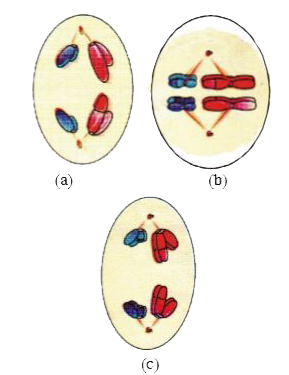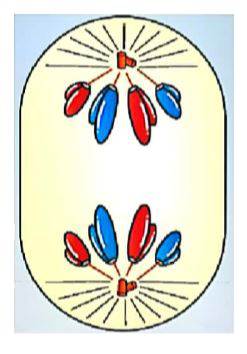Failure of separation of sister chromatids us
Fusion
Nondisjucntion
Complementation
Interference
The correct Answer is:B
Step-by-Step Solution:
1. Understanding Cell Division:
- During cell division, specifically in mitosis and meiosis, sister chromatids are formed. These chromatids are identical copies of a chromosome that are joined together at a region called the centromere.
2. Separation of Sister Chromatids:
- In normal cell division, sister chromatids are supposed to separate during anaphase. This separation allows each new daughter cell to receive an identical set of chromosomes.
3. Failure of Separation:
- If sister chromatids fail to separate properly during anaphase, this results in an unequal distribution of chromosomes in the daughter cells. This phenomenon is termed as "non-disjunction."
4. Identifying the Correct Term:
- The question asks for the term that describes the failure of separation of sister chromatids. The options provided include:
- Fusion
- Non-disjunction
- Complementation
- Interference
5. Analyzing the Options:
- Fusion: This refers to the merging of two entities, which does not apply to the separation of chromatids. Therefore, it is incorrect.
- Non-disjunction: This is the correct term for the failure of sister chromatids to separate during cell division.
- Complementation: This term generally refers to genetic interactions and does not relate to the separation of chromatids, making it incorrect.
- Interference: This term is used in genetics to describe the effect of one crossover event on another, which is not relevant to the separation of sister chromatids.
6. Conclusion:
- Based on the analysis, the correct answer to the question is "non-disjunction," which specifically describes the failure of sister chromatids to separate during cell division.
Final Answer: Non-disjunction
---
- During cell division, specifically in mitosis and meiosis, sister chromatids are formed. These chromatids are identical copies of a chromosome that are joined together at a region called the centromere.
- In normal cell division, sister chromatids are supposed to separate during anaphase. This separation allows each new daughter cell to receive an identical set of chromosomes.
- If sister chromatids fail to separate properly during anaphase, this results in an unequal distribution of chromosomes in the daughter cells. This phenomenon is termed as "non-disjunction."
- The question asks for the term that describes the failure of separation of sister chromatids. The options provided include:
- Fusion
- Non-disjunction
- Complementation
- Interference
- Fusion: This refers to the merging of two entities, which does not apply to the separation of chromatids. Therefore, it is incorrect.
- Non-disjunction: This is the correct term for the failure of sister chromatids to separate during cell division.
- Complementation: This term generally refers to genetic interactions and does not relate to the separation of chromatids, making it incorrect.
- Interference: This term is used in genetics to describe the effect of one crossover event on another, which is not relevant to the separation of sister chromatids.
- Based on the analysis, the correct answer to the question is "non-disjunction," which specifically describes the failure of sister chromatids to separate during cell division.
Topper's Solved these Questions
- CHROMOSOMAL BASIS OF INHERITANCEBOOK - DINESH PUBLICATION ENGLISHCHAPTER - CHROMOSOMAL BASIS OF INHERITANCEEXERCISE - Check Your Grasp
57 Videos
- CHORDATA- PROTOCHORDATABOOK - DINESH PUBLICATION ENGLISHCHAPTER - CHORDATA- PROTOCHORDATAEXERCISE - CYG
11 Videos
- COELENTERATA AND CTENOPHORA (OR CNIDARIA AND ACNIDARIA)BOOK - DINESH PUBLICATION ENGLISHCHAPTER - COELENTERATA AND CTENOPHORA (OR CNIDARIA AND ACNIDARIA)EXERCISE - CYG
10 Videos
Similar Questions
Knowledge Check
Failure of segregation of chromatids during cell division results in the gain or loss of chromososmes, this is called as
AeuploidyBmonoploidyCaneuploidyDpolyploidy
In disjunction (separation) of sister chromatids at anaphase
View SolutionFailure of segregation of chromatids during cell division cycle results in
View Solution
Match the above figures (a, b, c) with their events given below :-
(I) Nucleolus disappear
(II) Formation of tetrad of cell
(III) Homologous chromosomes separate
(IV) Microtubules attached to the kinetochore of sister chromatids
(V) Separation of sister chromatids
(VI) Bivalent chromosomes align on theequatorial plate
View SolutionIn meiosis, chromatids separate at
View SolutionSplitting of centromere and hence separation of chromatids occur during
View SolutionMicrotubules from opposite poles of spindle get attached to kinetochores of sister chromatids during
View SolutionThe figure given below represents the stage of cell division. Read the following statements.

(i) Nucleolus, Golgi complex and ER reform.
(ii) Chromatids move to the opposite pole.
(iii) The activity of the recombinase enzyme.
(iv) Homologous chromosomes separate while sister chromatids associated at their centromere.
(v ) Initiation of the assembly of the mitotic spindle.
How many of the above statements is not true with respect to the above figure
View Solution
